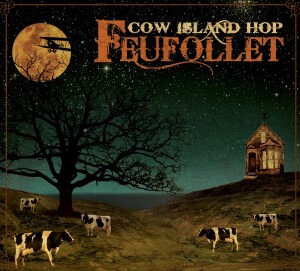 The musicians of Feufollet are still quite young, but Cow Island Hop is their fourth CD. It is an excellent collection of Cajun music.
The musicians of Feufollet are still quite young, but Cow Island Hop is their fourth CD. It is an excellent collection of Cajun music.
The six musicians of Feufollet (the name is a Cajun word for a prairie spirit or will-o-the-wisp — basically swamp gas) have been making music since they were children. But it seems that they’ve turned their precocity into solid musicianship and with Cow Island Hop are really coming into their own as a mature band.
As you’ll discover if you get this disc or visit their Web site, they’re highly respected by many of the Cajun world’s authorities. My favorite quote is from Barry Ancelet, one of the world’s top Cajun studies scholars (and a musician himself): “The music of Feufollet is a perfect example of what Dewey Balfa meant when he said that he wanted to preserve not the music itself but the process that produces the music so that musicians will continue to innovate and improvise new forms that both surprise us and reassure us at the same time.”
This music is very reassuring, and at times surprising. Anna Laura Edmiston sings the songs in a crystaline soprano that nails Cajun inflections. She’s backed by a group that hits things just right. Chris Segura and Chris Stafford often team up for a two-fiddle attack, and at other times Stafford plays accordion and also sings some leads. Josh Caffery plays stinging Telecaster rhythms and leads, while Michael Stafford on drums and Philippe Billeaudeaux on bass set the rhythm. That rhythm of course is one of the main aspects of Cajun music, which is after all dance music. When Segura, Stafford and Caffery all play the melody in unison, as they do for a while on the title track, it’s obvious that they’ve been playing together for a long time.
The disc is full of lively two-steps (“Prends Courage,” “Madame Bosso” and more) leavened by some romantic waltzes (Dennis McGee’s “Chere Bebe Creole” and the traditional “Eunice Waltz”), plus some honky-tonk complete with pedal steel (“Blues de Dix Ans”) and some sad Cajun ballads (“Sur le Bord de L’eau,” “Je M’en vas Dans le Chemin”). They’ve added syncopation, a horn section and swing to an old Creole song (that’s apparently been recorded only once before) “Femm l’a Dit,” crossing Cajun country with a little zydeco and some uptown New Orleans. The old-time “Jolie fille” has a sweet pedal steel break. And that McGee waltz is mellowed by the presence of a mellotron! That’s right, the old analog sampling synthesizer popularized by the Moody Blues.
Everything old is new again, and vice versa, when Feufollet plays. I like that a lot.
(Valcour, 2008)
